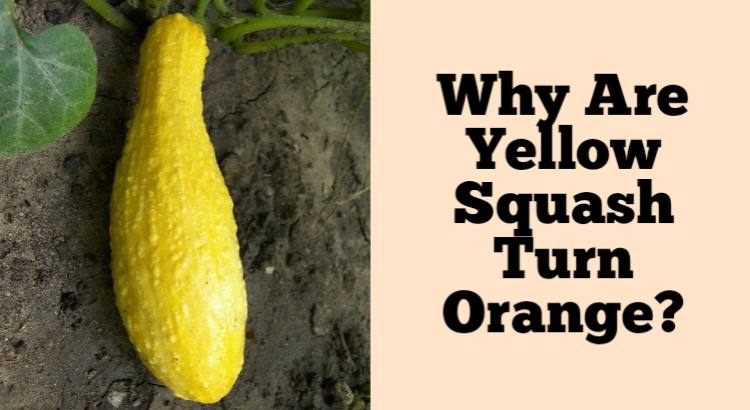There are many varieties of squash just like the yellow squash. But what if you are growing this plant in your garden, it produces fruits but instead of yellow they are turning orange.
Is there a problem with the fruit or what might be the causes why the yellow squash becomes orange in color?
Why Are Yellow Squash Turning Orange?
1. Overripe
When the yellow squash becomes overripe it will turn orange. The fruit becomes too mature and it changes its appearance and hardness.
You need to harvest those squashes while they are still yellow and a little bit young because letting them on the plant too long will harden and will turn them orange.
The taste of overripe squashes is not so good and they are tougher to chew. So when the yellow squash has enough size and is good enough to be harvested you must pick them.
When you cook those squashes they are great and will taste better than those too-hard squashes.
2. Sunlight Exposure
Sunlight exposure can make a yellow squash fruit becomes orange. If you are living in a place where the weather becomes hotter there is a chance that your squashes might be affected.
Squash plants love sunlight of at least 6 to 8 hours per day but the sunlight exposure can make the fruits become orange.
Since there are many leaves on the plant, those leaves can be used by the fruits as a shade. In that way, there will be less sunlight exposure which will keep the squashes yellow.
If the weather is just fine the squash fruits will stay yellow.
3. Nutrition Problem
Insufficient nutrition can affect the growth of squash plants. Lacking nutrients can make yellow squash orange. You need to keep the soil of high quality by adding fertilizer.
You can add organic or chemical fertilizer to help the plant grows. When the soil is rich in nutrients the growth of the plant and the fruits will just be fine.
Aside from lacking nutrients, overfertilizing can also affect squash plant growth. Too much fertilizer especially chemical fertilizer can cause fruits to be orange in color.
You just need to add enough fertilizer to the soil and try to avoid adding too much. When everything is fine the plant growth will be stable and there will have less or no problems with the fruits.
4. Diseases
If you are noticing something different on your squash plant you need to monitor and check if your squash plant gets a disease.
The disease can affect the growth of the plant and also its fruits. You can use a fungicide to treat or if you are practicing organic farming then try some other ways to control the disease.
By keeping the plant healthy there is a chance that it will be less likely to get a disease. You also need to keep an eye on pests that may damage the plant.
Some pests can cause damage to the yellow squash fruits which can make them turn orange.
FAQ:
Why Is My Yellow Squash Orange And Bumpy?
Yellow squash can become orange and bumpy when it becomes overripe. The yellow color changes to orange and it will get tougher.
Harvest the squash fruits as early as possible when they have enough size and they are not so hard yet. Letting the yellow squash mature for so long on the plant will make them orange and bumpy.
A disease can also cause the yellow-orange to become bumpy and you must monitor and keep the plants healthy.
Is Acorn Squash Supposed To Be Orange?
Depending on the variety some acorn squash is yellow, dark green, and some are orange. If you planted an acorn squash that produces green fruits and turns orange, there might be a problem with the fruit.
If that green acorn squash has some orange part you can check the inside of the fruit to know if it is still good. There are times that there is only a little orange part and the squash is still great to consume.
If the green acorn squash fruit becomes orange in color then it might overripe. Don’t let the acorn squash become overripe because it will change in color and hardness.
If the squash is not good to consume then throw them away. Or if you want to harvest seeds from your acorn plant then you can let those squashes mature and then harvest those seeds after.

